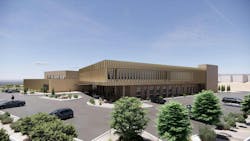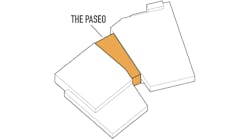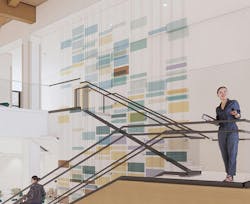Leveraging land and light to enhance patient care
With its arid, high-desert environment, abundant sunshine, mountain ranges, and blend of Native American, Spanish, and Anglo cultures, Santa Fe, N.M., has long referred to itself as “the city different.” The rich and diverse culture and connection to the land is tied to the mission of CHRISTUS St. Vincent Regional Medical Center (CSVRMC) and is reflected in its highly personalized and compassionate oncology care.
The empathy and collaborative care style of the staff, along with Santa Fe’s climate, landscape, and arts scene are inspiring a new cancer center we’re designing.
Designing for patient care
As my colleague Angela Mazzi FAIA, FACHA, EDAC has written about many times, we approach the design of healthcare facilities with the intent of creating salutogenic (health-generating) spaces. Especially in cancer care, we ask the question, “How can the built environment enhance healing?” As architects, she notes, we can’t cure diseases or control the amount of stress a patient might bring with them into a space. But once there, we can envelop them in an atmosphere designed to enhance and replenish the resources they have available to deal with their illness.
At CSVRMC, patients are known by name and greeted as friends. Throughout a patient’s journey—from check-in to diagnostics, consultations, treatment, and scheduling—staff are empowered to support patients, families, and each other. For their new facility, we worked to streamline touchpoints, enhance daylight and views, and provide physical anchors that evoke the natural world.
The building is organized to make all patient destinations accessible from a central artery called The Paseo del Curando (healing walk). In The Paseo, light, respite, conversation, and compassion flow in. This is a key part of supporting the staff’s empathetic, familiar, and hands-on care style.
The Paseo
The Paseo is where patients arrive, check-in and connect with staff. From The Paseo, they can access the teaching kitchen or coffee shop, connect in the family-oriented zone, and see ancillary services available to them. With approximately 800 people flowing through The Paseo daily, the design allows patients to choose their environment—open for social connection or protected for quiet conversations and consultations with medical staff.
Large expanses of glass on the east and west sides of the building catch long shadows at different times of day and bring light all the way through the two-story Paseo and help remove the institutional feel that people associate with healthcare facilities.
In facility design, promoting a sense of well-being and connection to nature goes beyond daylight and views out to the landscape. Art inspires. It can play a key role in healing, especially if its materials can evoke the natural world. In Santa Fe, art is celebrated everywhere and is being incorporated into the project in a unique and uplifting way. The Paseo is informed by the wind blowing through the arid landscape of Santa Fe and the rock formations and textures that result.
Glass feature wall
In collaboration with my colleague Eric Blyth, Bullseye Glass, and leveraging the expertise of our Director of Computational Design & Fabrication, Troy Malmstrom, the design team is crafting a custom-colored glass feature wall for the central staircase in The Paseo. We’ve been able to calculate color and texture movement, precisely calculate size and cost, and iterate different options.
“The wall will be made up of individual glass pieces, some will be clustered more densely, others spaced out,” explains Troy. “All of them will be held in place by custom clips we designed, prototyped, tested, and are having manufactured.” Good design, like good medical practice, combines art, science, technology, and is highly collaborative. The feature wall is integrated into the building’s central stair. Together they encourage movement; using the stairs also allows people to connect with each other (in a way that doesn’t happen in elevators) while also feeling grounded in a particular place.
Land, light, art, and technology all come into play for the design of the new cancer care facility that will deliver state-of-the-art care in an environment that celebrates individual choice, personal connection, and the healing power of nature. We’re bringing together these elements to support the staff as they do work they love, and to enhance the exceptional experience patients associate with CSVRMC cancer care.
GBBN (Designer of Record) is collaborating with Hartman + Majewski Design Group (Architect of Record) on this project.
About the Author:
Kristin Greeley is an interior designer at GBBN. Inspired by the poetics of space, Kristin has a deep appreciation of how artistry, technology, and flow can transform people’s experiences through physical space. Focusing on healthcare, she seeks opportunities to create spaces that are healing and supportive to everyone whose life they touch.


